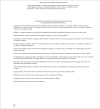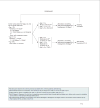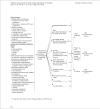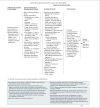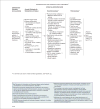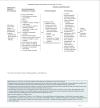Cancer-Related Fatigue, Version 2.2015
- PMID: 26285247
- PMCID: PMC5499710
- DOI: 10.6004/jnccn.2015.0122
Cancer-Related Fatigue, Version 2.2015
Abstract
Cancer-related fatigue is defined as a distressing, persistent, subjective sense of physical, emotional, and/or cognitive tiredness or exhaustion related to cancer or cancer treatment that is not proportional to recent activity and interferes with usual functioning. It is one of the most common side effects in patients with cancer. Fatigue has been shown to be a consequence of active treatment, but it may also persist into posttreatment periods. Furthermore, difficulties in end-of-life care can be compounded by fatigue. The NCCN Clinical Practice Guidelines in Oncology (NCCN Guidelines) for Cancer-Related Fatigue provide guidance on screening for fatigue and recommendations for interventions based on the stage of treatment. Interventions may include education and counseling, general strategies for the management of fatigue, and specific nonpharmacologic and pharmacologic interventions. Fatigue is a frequently underreported complication in patients with cancer and, when reported, is responsible for reduced quality of life. Therefore, routine screening to identify fatigue is an important component in improving the quality of life for patients living with cancer.
Copyright © 2015 by the National Comprehensive Cancer Network.
References
-
- Ahlberg K, Ekman T, Gaston-Johansson F, Mock V. Assessment and management of cancer-related fatigue in adults. Lancet. 2003;362:640–650. - PubMed
-
- Collins JJ, Devine TD, Dick GS, et al. The measurement of symptoms in young children with cancer: the validation of the Memorial Symptom Assessment Scale in children aged 7–12. J Pain Symptom Manage. 2002;23:10–16. - PubMed
-
- Henry DH, Viswanathan HN, Elkin EP, et al. Symptoms and treatment burden associated with cancer treatment: results from a cross-sectional national survey in the U. S Support Care Cancer. 2008;16:791–801. - PubMed
-
- Hofman M, Ryan JL, Figueroa-Moseley CD, et al. Cancer-related fatigue: the scale of the problem. Oncologist. 2007;12(Suppl 1):4–10. - PubMed

